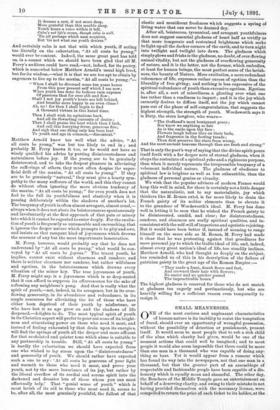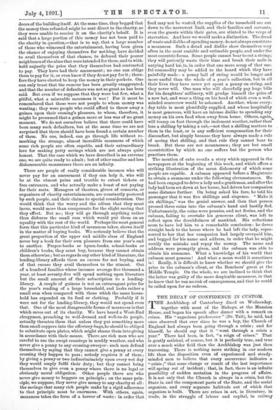SMALL MEANNESSES.
ONE of the most curious and unpleasant characteristics of human nature is its inability to resist the temptation of fraud, should ever an opportunity of wrongful possession, without the possibility of detection or punishment, present itself. It would seem to most people that to rob a sick child of the alms which charity had given, would be one of the meanest actions that could well be imagined ; and to most people it would also seem impossible that there could be more than one man in a thousand who was capable of doing any- thing so base. Yet it would appear from a rumour which has found its way into the newspapers, not that one man in a thousand, but that the greater part of an assemblage of respectable and fashionable people have been capable of a dis- honesty which is equally mean and shameful. The other day, the Benchers of the Middle Temple gave an entertainment on behalf of a deserving charity, and owing to their mistake in not having provided themselves with the necessary licence, were compelled to return the price of each ticket to its holder, at the doors of the building itself. At the same time, they begged that the money thus refunded might be sent direct to the charity, as they were unable to receive it on the charity's behalf. It is said that a large portion of this money has not been paid to the charity in question,—that is to say, that a large number of those who witnessed the entertainment, having been given the chance of enjoying themselves for nothing, have decided to avail themselves of that chance, to defraud their poorer neighbours of the alms that were intended for them, and to with- hold unjustly the price that they themselves had contracted to pay. They have had their amusement ; no one can oblige them to pay for it, or even know if they do not pay for it ; there- fore they have elected to keep the money in their pockets. One can only trust that the rumour has been greatly exaggerated, and that the number of defaulters was not so great as has been said. Bnt even if we suppose that they were but few, what a pitiful, what a miserable meanness it was ! For it must be remembered that these were not people to whom money was wanting; they were people who could afford to throw away a guinea upon their evening's pleasure, to whom, therefore, it might be presumed that a guinea more or less was of no great moment. We do not ourselves believe that there could have been many such defaulters, but at the same time we are not surprised that there should have been found a certain number of them. No one, indeed, can go through life without re- marking the strange, almost incredible meanness of which some rich people are often capable, and their extraordinary love for making petty savings which are not always quite honest. That the case which we have described is an extreme one, we are quite ready to admit; but of other smaller and less dishonourable meannesses there are an infinity.
There are people of really considerable incomes who will never pay for an amusement if they can help it, who will be at the utmost pains and trouble to extort tickets or free entrances, and who actually make a boast of not paying for their seats. Managers of theatres, givers of concerts, or organisers of charity entertainments, are constantly pestered by such people, and their claims to special consideration. One would think that the worry and the odium that they must incur, would more than compensate for the slight saving that they effect. But no; they will go through anything rather than disburse the small sum which would put them on an equality with the rest of the world. Perhaps the most general form that this particular kind of meanness takes, shows itself in the matter of baying books. We seriously believe that the great proportion of the upper and middle class of England never buy a book for their own pleasure from one year's end to another. Prayer-books or hymn-books, school-books or children's books, they must buy, because they cannot obtain them otherwise ; but as regards any other kind of literature, the lending-library affords them an excuse for not buying, and of that excuse they avail themselves to the utmost. Out of a hundred families whose incomes average five thousand a year, at least seventy-five will spend nothing upon literature but the small amount of their subscription to a lending- library. A couple of guineas is not an extravagant price for the year's reading of a large household, and looks rather a small sum when compared with those which the same house- hold has expended on its food or clothing. Probably if it were not for the lending-library, they would not spend even that. One of the most disagreeable forms of meanness is that which saves out of its charity. We have heard a West-End clergyman, preaching to well-dressed and well-to-do people, actually threaten them that unless they put something more than small coppers into the offertory-bags, he should be obliged to substitute open plates, which might shame them into giving in accordance with their means. There are rich men who are careful to use the swept crossings in muddy weather, and who never give a penny to any crossing-sweeper : such men defend themselves by saying that they cannot give a penny at every crossing they happen to pass ; nobody requires it of them; by giving a penny or two indiscriminately upon every wet day they would amply fulfil their duty; but they cannot bring themselves to give even a penny where there is no legal or obviously moral obligation. Other people there are who never give money to beggars on principle ; on the same prin- ciple, we suppose, they never give money to any charity at all : the savings that many rich people make by a rigid adherence to that principle must be enormous. With others, again, meanness takes the form of a horror of waste : in order that
food may not be wasted, the supplies of the household are cut down to the narrowest limit, and their families and servants, even the guests within their gates, are stinted to the verge of starvation. And here we would make a distinction. The dread of waste and dislike of spending money, do not always constitute a meanness. Such a dread and dislike show themselves very often in the most amiable and estimable people, and under the most eccentric forms. Some people cannot bear to cut a string ; they will patien'ly waste their time and break their nails in untying hard kn \ ts, in order that one more scrap of that use- ful commodity may be added to the hoard which they have painfully made : a penny ball of string would be longer and more useful than the whole of a year's collection, but in all their lives they have never yet spent a penny on string, and they never will. One man who will cheerfully pay huge bills for his daughters' millinery, will grudge himself the price of a new bat, and wear a thing on his head of which even a well- minded scarecrow would be ashamed. Another, whose every- day table is most plentifully supplied, and whose hospitality is most generous, will have an intense dislike to spending any money on his own food when away from home. Others, again, will tramp on foot through the inclement weather, rather than lose a shilling by taking a cab,—not that a shilling matters to them in the least, or is any sufficient compensation for their discomfort, but simply because they have always made a rule of saving that shilling, and that rule they cannot bear to break. But these are not meannesses ; they are but small eccentricities by which no one suffers but the person who practises them.
The mention of cabs recalls a story which appeared in the newspapers at the beginning of this week, and which offers a striking illustration of the mean dishonesty of which some people are capable. A cabman appeared before a Magistrate to obtain a summons under the following circumstances. He had been engaged to drive a lady and a gentleman, and after the lady had been set down at her house, had driven her companion some distance further. On being asked his fare, he told his passenger that it was five shillings and sixpence. " Make it six shillings," was the genial answer, and then that person pressed three coins into the cabman's hand and hastily fled. Unfortunately, the coins were pennies, and not florins, and the cabman, failing to overtake his generous client, was left to reflect upon the deceitfulness of mankind. His reflections seem to have led him to a remarkable conclusion: he drove straight back to the house where he had left the lady, repre- sented to her that her companion had largely overpaid him, and begged for his name and address, in order that he might rectify the mistake and repay the money. The name and address were promptly given, and the cabman was able to obtain his summons. What a knowledge of his world that cabman must possess ! And what a mean world it sometimes is ! Really, it is difficult to know whether we should give the prize to the cabman's client, or the Benchers' guest at the Middle Temple. On the whole, we are inclined to think that the latter was guilty of the more despicable meanness, in that he knew that he ran no risk of consequences, and that he could be called upon for no redress.











































 Previous page
Previous page